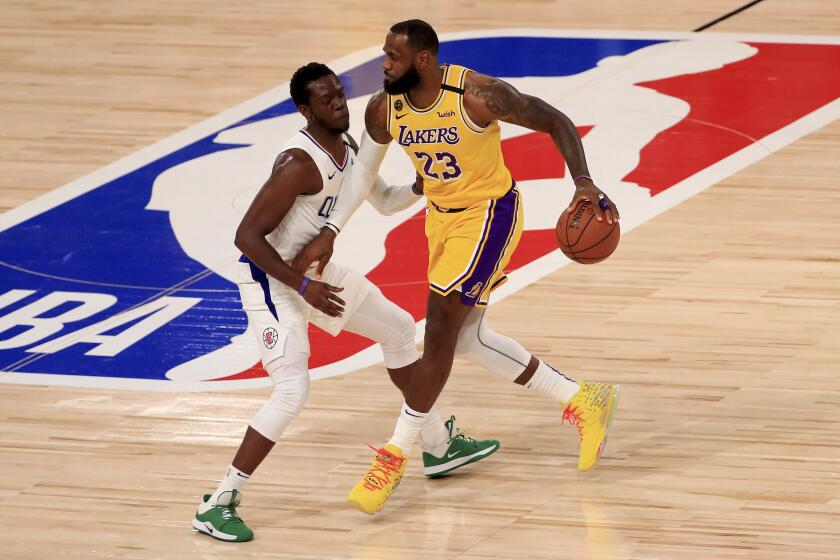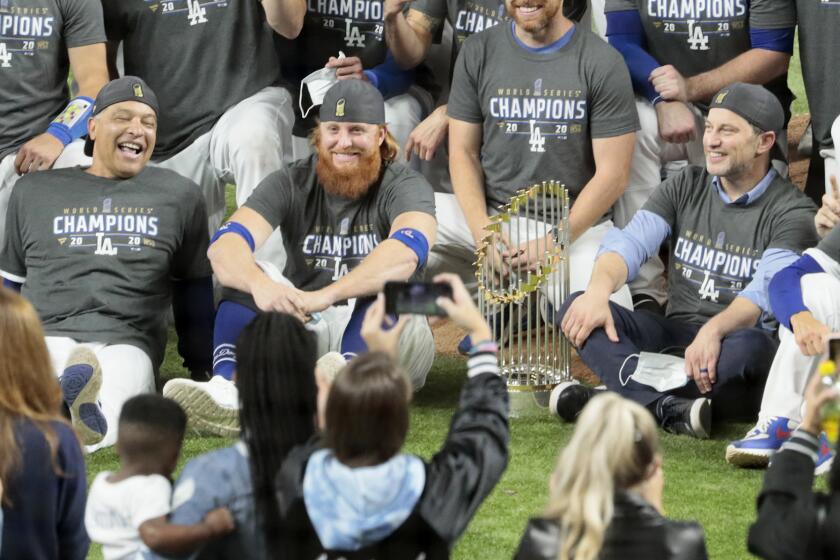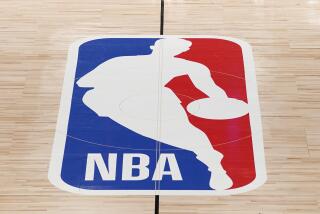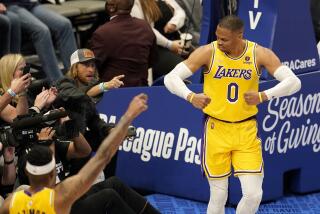What the NBA and players’ union must resolve to start new season
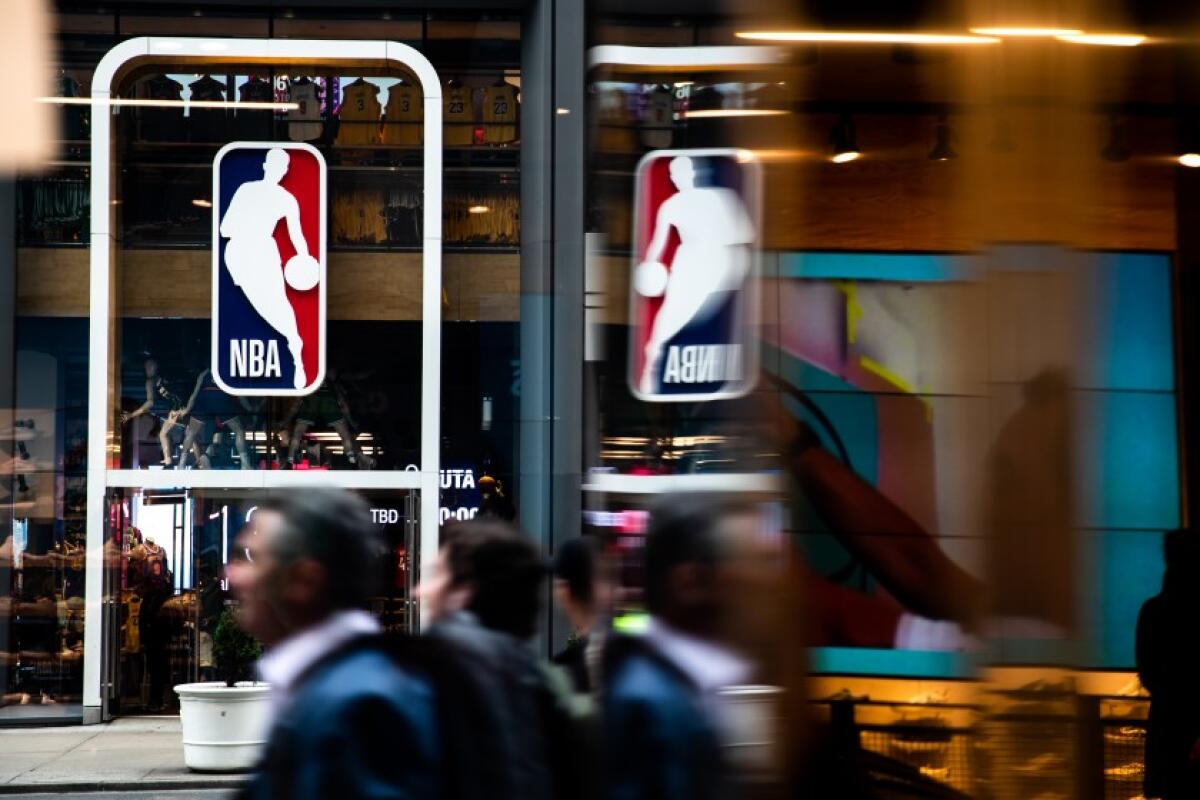
The NBA and the National Basketball Players Assn. are entering another week of negotiations on when and how to start the 2020-21 season with the immediate future of the league at stake, and they’re doing it with the uneasy knowledge that the puzzle in front of them is more difficult than the one they solved months ago.
In the teeth of a global pandemic, faced with billions of dollars evaporating from balance sheets and no clear path to a finish line, the NBA and its players’ union figured out how to build a Florida bubble. They agreed on protocols that kept the players from recording a single case of COVID-19 while the virus thrived around them. They salvaged some money while crowning deserving champions in LeBron James and the Lakers.
None of it was easy or normal. Compared with the advanced calculus those sides are trying to figure out now, though, the bubble seems like simple arithmetic.
Based on conversations with NBA officials, team executive, union representatives and players, the complicated issues can be distilled into three intertwined categories that have to be dealt with in order for the NBA to finalize a plan for next season.
The format
So when is this thing going to happen?
That’s a big question for the parties on the periphery of the negotiations — people like officials, team executives and scouts. People want to know when they’re going to work again, how much longer they have in their offseasons and when they can start planning for what’s ahead. The two sides have a Friday deadline for either to opt out of the collective bargaining agreement, though it wouldn’t officially terminate until Dec. 14, allowing for ongoing negotiations.
For executives, it’s been particularly frustrating. Without a start date for next season, there’s no calendar for this offseason. Contract extensions, player and team options, trades and free agency all have to wait while the NBA and NBPA figure out when next season is going to happen.
And that’s a contentious question.
The NBA wants to start the season Dec. 22, keeping their marquee day, Christmas, for their television partners while helping push the 2021-22 season back to a regular October-June schedule.
“Why not now?” one NBA person asked, citing the inevitability of an abbreviated offseason if the league is going to get back to normal. Players, including stars like James, aren’t eager for a December start — one that seemed unlikely a month ago with the NBA Finals underway. They were aiming for a January start around Martin Luther King Jr. Day.
Beginning next season before the bruises from last season heal isn’t popular among the teams that were in the bubble the longest, with the Lakers and runner-up Miami Heat possibly starting a new season 2 1/2 months after completing the last instead of the usual four.
The NBA and its players union are in talks about the 2020-21 season start, which includes a proposal to begin around Christmas and another with bubble sites.
The counter argument is that most of the league was home by Sept. 1, and even the teams that played deep into the playoffs benefitted from an extended break in the time between the league’s March shutdown and July restart.
There’s also the matter of how many games the NBA will play. The overwhelming preference is to wrap the season by July, keeping the league clear of TV competition with the 2021 Summer Olympics in Tokyo.
The funds
If you wondered “why do the NBA and NBPA feel that way?” the answer is simple — money.
If the NBA thought it could put fans in stands with any reliability this season, it would wait. Arena revenue is approximately 40% of the league’s overall cashflow.
With no tickets being sold, the NBA’s TV partners have more power. It’s why Christmas games are so important, in addition to avoiding viewing conflicts in the summer and fall with the Olympics and the NFL.
The questions of games played obviously has financial impacts for the players — an 82-game salary is different from a 72-game salary. National TV and most regional TV deals are already signed and paid for, with minimum delivery requirements for the league and teams to meet. If the NBA were to come up short, TV partners could either get money back now or receive product for free in the future.
L.A. Mayor Eric Garcetti said the Dodgers and Lakers will indeed celebrate their championships with fans, somehow, some way. He is open to suggestions.
The NBA is about to head into uncharted financial territory. The decisions made in the next week or so will be the blueprint for surviving it, and players will shoulder some of the sacrifice.
The future
Some of the most pessimistic people don’t believe a labor stoppage is in the NBA’s future. Both the league and the players grasp the unprecedented nature of the current situation.
What makes this upcoming season different from any other in league history is the specter of the coronavirus infiltrating the NBA while the league tries to play through it.
It was clear early in the bubble that the NBA’s protocols were going to be successful as long as commitment and vigilance remained. They did, and the league finished its season without the virus costing them a single game.
With a return to any type of bubble believed to be a nonstarter, the coronavirus will undoubtedly have an effect on the upcoming season in ways that the league didn’t have to deal with in Orlando, Fla.
Games will likely need to be postponed and rescheduled. Star players could miss extended time. Full-on outbreaks could happen. Building in time for scheduling problems will have to be negotiated.
The season the NBA just wrapped didn’t involve any of that once it restarted. The one they’re about to begin likely can’t avoid that.
It makes a complicated situation more complicated, with the format and the financial discussions beginning of the challenges ahead.
More to Read
Go beyond the scoreboard
Get the latest on L.A.'s teams in the daily Sports Report newsletter.
You may occasionally receive promotional content from the Los Angeles Times.

